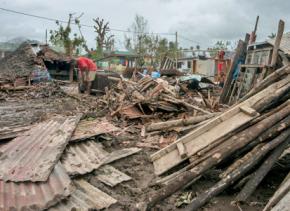Climate catastrophe in the South Pacific
One of the most powerful storms in recorded history has devastated Vanuatu, an island nation in the Pacific Ocean, 1,000 miles east of Australia. Days after Cyclone Pam made landfall, the full extent of the casualties and damage remained unknown, and relief organizations were struggling to get basic supplies to more remote islands.
Vanuatu today is dealing with the consequences not only of a catastrophic storm, but of the man-made disasters of British and French colonialism in the past and neo-colonialism in the present, along with the ongoing threat of climate change. provides the backdrop to the crisis in an article written for the revolutionary socialism in the 21st century website.
"WE SEE the level of sea rise...The cyclone seasons, the warm, the rain, all this is affected," said Vanuatu's President Baldwin Lonsdale at a UN conference in Japan. "This year we have more than in any year...Yes, climate change is contributing to this."
According to the UNICEF report, at least six people are known to have been killed and 20 injured so far in the capital Port Vila, but there is no morgue capacity. On the island of Efate, where Port Vila is located, 90 percent of the infrastructure has been destroyed. The water supply has only been restored in some areas, and it is not clear whether it is safe to drink. The main hospital in Port Vila is short on medical staff, and its kitchen is largely unusable.
Meanwhile, the Category 5 Cyclone Pam has caused destruction on other Pacific Islands: in Tuvalu, 45 percent of the population has been evacuated, crops have been ruined and livestock killed, and health centers destroyed in the northern islands. Tuvalu is waiting for air drops from Australia and New Zealand.

The islands of the South Pacific are in desperate need of humanitarian aid. The airlifts from the New Zealand and Australian military are currently providing a lifeline. However, the extreme inequality of power between the island states and their neighbors and the experience of recent history suggests we may see the injustice of a climate catastrophe made elsewhere compounded by the ravages of disaster capitalism and neo-colonialism.
The experience of the 2004 tsunami in the Indian Ocean was followed by what Naomi Klein described as a "second tsunami" in her book The Shock Doctrine, where militarized gentrification followed the original wave of destruction from the sea. Institutions such as the World Bank backed the Maldives government as it relocated entire populations of multiple islands under its "Safe Island Program," making way for the development of tourism on the now depopulated beaches.
Vanuatu was under a joint British and French colonial administration until 1980, leaving a legacy of tensions between Anglophone and Francophone populations, fostered by competition between the two administrations. Its people are now faced with neo-colonialism in the form of aggressive free trade agreements designed to pry open the economies of the Pacific Islands for Australian, New Zealand and global capital. Vanuatu is due to host the latest set of so-called PACER Plus talks later this year.
Australian regional imperialism in the South Pacific comes backed up with military force: In 2003, in the context of the "war on terror," Australian troops were sent to the Solomon Islands, and have continued their occupation ever since. This is shaped by the wider context of the Australian ruling class's concerns about growing Chinese influence in what they see as their own "backyard," and by their efforts to position Australia as a key U.S. ally in its "pivot to Asia."
The people of the South Pacific islands are painfully dependent on international aid at this moment. The reason is an unfolding climate catastrophe caused by imperial powers that will now present themselves as the islanders' saviors. What is needed is reparations, not aid.
First published at the rs21 website.


